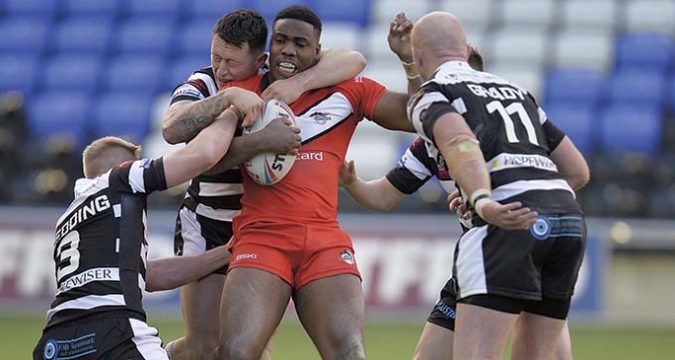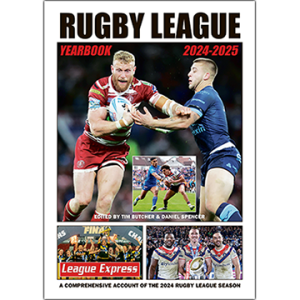
The country has been plunged into a third national lockdown and with that, Championship and League 1 clubs are already feeling the effects.
Last week the RFL advised clubs to shut down for ten days given the evidence presented by their clinical advisory board. This was based on health and safety grounds. It’s also given both the governing body and the clubs time to assess and potentially change their plans and protocols moving forward.
That’s set to be discussed in a meeting of clubs on Wednesday, with challenges and concerns set to be addressed.
Similarly, clubs debated for months about whether the 2020 season should continue, with a majority eventually agreeing it should be declared null and void.
The primary concerns of many clubs back then was the inability to entertain crowds. A February start this year was with the view of fans being allowed back in from April. That is, of course, a hope that is becoming bleaker by the day.
“When the season was pencilled in it was based on April and five weeks without crowds,” said Liam Claffey, the Sheffield Eagles general manager.
“That was deemed an amount of time that clubs could cope without crowds. That may have moved on a bit as clubs have been able to utilise furlough and apply for the government loan, but I can’t see a full season being feasible behind closed doors.
“You’d hope sooner rather than later, with respect, clubs at this level don’t get the largest crowds, but the majority are in spacious stadiums so not at full capacity. But who knows when fans will be allowed? And that’s the issue. Crowds are unlikely for some time. 26 rounds would be difficult, so when we start and the length of it is something to be discussed.”
There’s little getting away from the fact that the uncertainty surrounding crowds is a cause for concern. At the same time, it’s also seen as a reason why the season must return with little disruption.
“We have to accept there has to be compromise and no ideal solution, and a bit of pain,” Halifax Panthers’ Director of Rugby Ian Croad said.
“We’ve to concede that starting the season with crowds isn’t realistic. The income lost with that is the unknown, we don’t know how many will want to watch it on a stream. It saves on the rental of grounds, stewarding, but we still have to pay players and stream, but on a league fixture, clubs have a budget and figure in mind for expected revenue per fixture. If Halifax got Bradford the first league fixture behind closed, we have a significantly higher budget for that than other games, but before the fixture list comes out nobody knows what they’re losing out on.
“But this won’t go on forever. It will hurt people differently but at the end of the day, we all have to get on the field.”
There are a number of reasons why returning to the field is desirable, but also needed.
“Last year sponsors and fans gave back season ticket money, we can’t take money again and say we’re not playing,” Croad points out.
Additionally, a meaningful season is required to ensure promotion and relegation takes place at the end of the season.
Last year, Leigh and Featherstone were vocal in their dismay at the RFL’s lack of clarity on what that entailed. As a result, Rovers are one of many clubs keen to return to the field to ensure they have a fighting chance.
“What I deem a meaningful season is to play enough rounds to get a play-off spot then it starts again, hence why Featherstone Rovers made a Grand Final last year,” said CEO Davide Longo.
“We are absolutely good to go. If they said we were playing next week, we’d play next week.
“If we’ve got to adhere to all the new Covid measures in place and we have to put extra testing on then we will.”
The issue, of course, is that some clubs may not see that as logistically, or financially, viable.
“I think lateral flow testing will play a big part if we up the number of times we do testing, and any uplift is a burden cost to the clubs,” Longo said.
“If we have to do it every training sessions, that’s four to five times a week. The cost and man-hours it takes to complete them for 30 odd players, it will take five or six staff testing them.”
From a playing perspective, there’s a fear that a lengthy lay-off would be compounded by the additional time that would then be needed to get players up to speed.
For coaches of the 24 clubs in the two divisions, the delay has already been an inconvenience as they gear up for the season, which is due to start on the last weekend of February. If further delays occur, it will become a much wider problem.
“We’ve been planning for the end of February and you build your pre-season schedule around that,” Dewsbury coach Lee Greenwood said.
“A week and a half off is manageable but it becomes a bit of a nightmare if we carry on that was as it makes the phase up to Christmas a waste. Before Christmas, you’re easing them in gently and building them up to a point where they’re physically ready for friendlies.
“But if we have a massive gap with no contact, no skills, and no fitness, you’re going back to scratch, it takes six to eight weeks at least for full contact because if not you’re crying out for injuries.”
Even accessing training facilities has been a concern for some clubs. Many across the competitions use public gyms and colleges as their training bases, which are currently shut.
However, on the large part, the elite exemption title the competitions hold has meant they’ve been able to access those facilities.
“It’s actually safer than being in a lower tier as we’re the only people who can access the facility, ” Croad said. Halifax uses Calderdale College as their training base.
The elite exemption aspect throws another huge dose of uncertainty into the mix.
As it stands, the season can start as planned. But if Public Health England were to tighten, or worse – revoke elite sport from the exemption list (there have been small rumblings suggesting it’s a consideration), all bets would then be off.
The other red herring, of course, is the involvement of Toulouse Olympique. The French government have advised against cross-channel matches,
European rugby’s Champions Cup and Challenge Cup have been suspended following the calls from French clubs. It’s hard to see the Championship being as accomodating.
Generally, there appears to be a greater desire to get the season up and running compared to last year when clubs were discussing the return of the 2020 campaign.
Whether that changes after Wednesday’s meetings when the RFL lay out their findings and new requirements, remains to be seen.
“I think the players are struggling,” Claffey adds.
“They don’t know where you stand, we had everything set up for Covid then the announcement comes on Tuesday. We create a new schedule with what’s happening then it goes again. It’s worrying for them as they don’t know where they are from one day to the next. It’s difficult as they’ve been off almost a year, I single out James and Glover, with their injuries they’ve not played since May 2019. It’s tough for them as it’s a massive part of their lives, then you get training and your gone again. It’s a big part of their social life too, albeit working and training, but it’s tough to pull it from them again. We’ve put some of our players in contact with our Chaplin and RL Cares and support.
“We’re hoping a clear decision is made and we can move forward together.”




